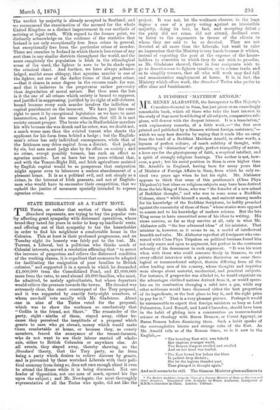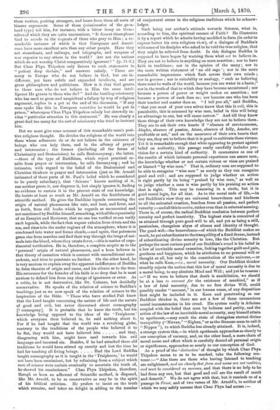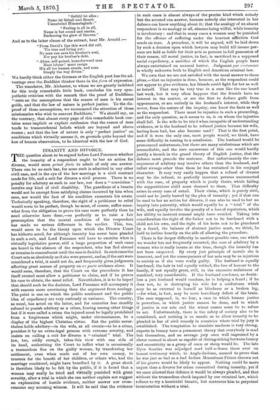A BUDDHIST MATTHEW ARNOLD.'
MR. HENRY ALABASTER, the Interpreter to Her Majesty's Consulate-General in Siam, has just given us an exceedingly remarkable book, which all those who take the least interest in the study of that most bewildering of all subjects, comparative reli- gions, will devour with the deepest interest. It is a translation," with explanatory remarks, of a little work,—" the first ever printed and published by a Siamese without foreign assistance,"— which we may best describe by saying that it reads like an essay from the hand of a Buddhist Matthew Arnold, in other words, a layman of perfect culture, of much subtlety of thought, with something of ' distinction ' of style, perfect tranquillity of nature, a keen eye for the physiognomy of faith, a sceptical intellect, and a spirit of strongly religious leanings. The author is not, how- ever, a poet ; but his social position in Siam is even higher than Mr. Arnold's in England, having been for many years that of Minister of Foreign Affairs in Siam, from which he only re- tired two years ago when he lost his sight. Mr. Alabaster appears to think that some of this gentleman's (Chao Phya Thipakon's) best ideas on religious subjects may have been derived from the late King of Siam, who was "the founder of a new school of Buddhist thought," and who was in some sense a Buddhist Colenso, since" while himself a monk, and eminent among monks for his knowledge of the Buddhist Scriptures, he boldly preached against the canonicity of those of them" whose stories were opposed to reason and to his knowledge of modern science. But the late King seems to have committed none of his ideas to writing. His views survive, so far as they survive at all, only in what Mr. Alabaster calls "the less advanced ideas" of his minister. That minister is, however, as it seems to us, a model of intellectual breadth and calm. Mr. Alabaster says that all foreigners who con- versed with Chao Phya Thipakon on political business found hint not only suave and open to argument, but perfect in the courteous urbanity of his demeanour in such argument. "It was his wont when with those who could converse freely in Siamese, to end every official interview with a private discussion on some theo- logical or transcendental subject, therein differing front all the other leading men of his country, whose thoughts and inquiries were always about material, mechanical, and practical subjects. For instance, if gunpowder was alluded to, he would expatiate on the advantages civilized nations derived from it, or would specu- late on its combustion changing a solid into a gas, while any other nobleman would have discussed either the best proportion of its ingredients, or the best place to buy it, and the right price to pay for it." That is a very pleasant picture. Perhaps it would be unreasonable to expect that foreign ministers so busy as Lord Palmerston, Lord Russell, and Lord Clarendon, should have been in the habit of gliding into a conversation on transcendental science or theology with Baron Brunow, or Count Apponyi, or Baron Bunsen before dismissing them. Such a habit speaks of the contemplative leisure and strange calm of the East. As Mr. Arnold tells us of the Roman times, so is it now in the English,— • The Modern Buddhist ; being the Fines of a Siamese Minister of State on Ms Own and Other Religions. Translated with Remarks by Henry Alabaster, Interpreter a H.B.M.'s Consulate in China. London: TrUbner. " The brooding East with awe beheld
Her impious younger world, The Roman tempest swelled and swelled And on her head was burled.
"The East bowed low before the blast In patient deep disdain;
She let the legions thunder past-. Then plunged in thought again."
And so it seems to be still. The Siamese Minister gives audience to these restless, pushing strangers, and hears from them all sorts of bizarre arguments. Some of them (missionaries of the go-a- head type) tell him, for instance, with a bitter irony on them- selves of which they are quite unconscious, "it does at times please God to accede to the requests of those who pray to Him ; a re- markable instance of which is that Europeans and Ameri- cans have more excellent arts than any other people. Have they not steamboats, and railways, and telegraphs, and weapons of war superior to any others in the world ? Are not the nations which do not worship Christ comparatively ignorant?" (p. 31-2.) But Chao Phya Thipakon only listens to such statements in " patient deep disdain," and answers calmly, "There are many in Europe who do not believe in God, but are in- different, yet have subtle and expanded intellects, and are great philosophers and politicians. How is it that God grants to those men who do not believe in Him the same intel- ligence He grants to those who do?" And the bustling missionary who has used so gross and unspiritual a fallacy by way of religious argument, replies in a pet at the end of the discussion, "If any man spake like this in European countries he would be put in prison," whereupon Chao Phya Thipakon calmly but shrewdly in- vites "particular attention to this statement." He was clearly a great deal too many for the sort of missionary who tried to instruct him.
But we must give some account of this remarkable man's posi- tive religious thought. He divides the religions of the world into those whose adherents do or do not believe in the existence of beings who can help them, and in the efficacy of prayer and intercession ; the former (including all the forms of Christianity and Brahminism) he calls Brahmanyang ; the latter, —those of the type of Buddhism, which reject practical re- sults from prayer or intercession, he calls Samanyang ; and he intimates, with regard to the belief of the Brahminical and Christian thinkers in prayer and intercession (just as Mr. Arnold intimated of those parts of St. Paul's belief which he considered to be purely subsidiary), that 'Science' knows nothing of it, can neither prove it, nor disprove it, but simply ignores it, finding no evidence to sustain it in the present state of our knowledge. He insists at least as much as Mr. Arnold on the fruitfulness of scientific method. He gives the Buddhist legends concerning the origin of natural phenomena like rain, and heat, and fever, and so forth, from old books which he regards as uncanonical and not sanctioned by Buddha himself, remarking, with all the equanimity of an Essayist and Reviewer, that no one has verified or can verify such legends, while the fact that vapour exhales from rivers and the sea, and rises into the cooler regions of the atmosphere, where it is condensed into water and forms clouds,—and again, that poisonous gases rise from marshes and find their way through the lungs of ani- mals into the blood, where they create fever,—this is matter of expe- rimental verification. He is, therefore, a complete sceptic as to the ' personal ' origin of natural phenomena, and a keen believer in that theory of causation which is content with unconditional ante- cedents, and tries to penetrate no further. On the other hand, he is very anxious to explain away the apparent indifference of Buddha to false theories of origin and cause, and his silence as to the true. His reverence for the founder of his faith is so deep that he is most anxious to defend him from any charge of ignorance or error. As a critic, he is not destructive, like Dr. Colenso, but decidedly conservative. He speaks of the relation of science to Buddha's teachings just as we now speak of the relation of science to the inspiration of the Bible. "Those who have studied Pali know that the Lord taught concerning the nature of life and the nature of good and evil, but never discoursed about cosmography [? cosmogony]. It is probable that he knew the truth, but his knowledge being opposed to the ideas of the Traiphoom ' which everyone then believed in, he said nothing about it. For if he had taught that the world was a revolving globe, contrary to the traditions of the people who believed it to be flat, they would not have believed him and they, disagreeing with him, might have used towards him evil language and incurred sin. Besides, if he had attacked these old traditions he would have stirred up enmity and lost the time he had for teaching all living beings Had the Lord Buddha taught cosmography as it is taught in the Tmiphoom,' he would not have been omniscient, but by refraining from a subject which men of science were certain eventually to ascertain the truth of, he showed his omniscience." Chao Phya Ihipakon, therefore, though so keen an adherent of Scientific method, is disposed, like Mr. Arnold, to be as conservative as may be in the spirit of his biblical criticism. He prefers to insist on the truth which remains, and takes no delight in adding to the number of conjectural errors in the religious traditions which he acknow- ledges.
Such being our author's attitude towards Science, what is, according to him, the spiritual essence of Faith ? He illustrates it by a report which he admits having modified in form (in order to express better his own religious view), of a dialogue of Buddha's with some of his disciples who asked to be told the true religion, that they might be relieved from doubt. In this dialogue Buddha is supposed to have begun by warning them what not to believe in. They are not to believe in anything on mere assertion ; nor to have faith in traditions ; nor in the opinion of the many ; nor in the mere written statement of an old sage ' ;- nor in the more remarkable impressions which flash across their own minds ; nor in guesses ; nor in suitability or analogy, "such as believing there must be walls of the world, because you see water in a basin ;" nor in the truth of that to which they have become accustomed ; nor because a person of power or weight makes an assertion ; nor because a person of rank does so ; nor because one who has been their teacher and master does so. "I tell you all," said Buddha, "that you must of your own selves know that this is evil, this is punishable, this is censured by wise men, belief in this will bring no advantage to one, but will cause sorrow." And till they know these things of their own knowledge they are not to believe them. They are to ask their own hearts if "absence of covetousnesss, Alopho, absence of passion, Atoso, absence of folly, Amoho, are profitable or not," and on the assurance of their own hearts that they are, they are to believe that it is good to cultivate these virtues. Yet it is remarkable enough that while appearing to protest against belief on authority, this passage really carefully includes pro- vision for a certain kind of authority. It enumerates as one of the results of which intimate personal experience can assure men, the knowledge whether or not certain virtues or vices are praised or blamed "by wise men." That is, ordinary men are supposed to be able to recognize "wise men" as surely as they can recognize good and evil ; and are supposed to judge whether an action is right partly by its being "praised by wise men," as well as to judge whether a man is wise partly by his praising an action that is right. This may be reasoning in a circle, but it is good moral logic, for all that. As to the moral ends of life,—in our Buddhist's view they are universal benevolence and kindness to all the animated creation, freedom from all passion, and perfect veracity ;--and all this in motive, rather even than in external seeming. There is, of course, the radical Buddhist confusion between perfect serenity and perfect inactivity. The highest state is conceived of as attained through pure good-will to all, and yet as being a still, passionless, changeless abyss of silence and identity of thought. The good-will—the benevolence—of which the Buddhist makes so much, he yet subordinates to the tranquillity of a fixed dream, instead of subordinating divine serenity to love, like the Christian. But perhaps the most curious part of our Buddhist's creed is his belief in a law of inevitable moral causation, linking together guilt and pain, goodness and happiness, which he attributes to no personal will or thought at all, but only to the constitution of the universe,— or what he calls Kam,—i.e., moral necessity. Our Buddhist thinker steadily rejects the notion that this law of moral necessity is due to a moral being, to any absolute Mind and Will ; and yet he reasons : —" If we were to believe that death is annihilation, we should be at a loss to account for the existence of mankind," as if a law of fatal necessity, due to no free divine Will, could possibly render "account," in our human sense, of any disposition that might be included in it. Keen and penetrating as our Buddhist thinker is, there are not a few of these unconscious moral inconsistencies in his creed. His system really is Atheism coupled with the belief that man by holiness and purity, and the action of the law of an inevitable moral necessity, may himself attain to apotheosis,—may reach the state of changeless eternal divine tranquillity ("Nirvan," "Nigban," or as the Siamese seem to call it " Nippen "), to which Buddha has already attained. It is, indeed, a strange system this,—in which apotheosis approaches so closely to our conception of vacancy, and, on the other hand, a mere chain of moral cause and effect which is carefully denied all personal origin or significance, approaches so nearly to our conception of God.
As a proof of the 'distinction' of thought by which Chao Phya Thipakon seems to us to be marked, take the following sen- tence :—" Also there are those who having listened to teaching are enlightened, and see clearly that form and name are not realities, and must be considered as sorrows, and that there is no help to be had from any one, but that good and evil are the result of merit and demerit." We do not agree with that, but it reminds us of a. passage in Faust, and of two verses of Mr. Arnold's, to neither of which we may safely assume that Chao Phya had access :—
"Gefühl ist alias; Name ist Saban und Rauch Umnebelnd Himmelsgluth :" "Feeling is all in all, Name is but sound and smoke, Darkening the glow of Heaven."
And as to the latter clause of the extract, hear Mr. Arnold :—
"From David's lips this word did roll, 'Tis true and living yet : No man can save his brother's soul, Nor pay his brother's debt.
"Alone, self-poised, henceforward man Must labour ! must resign
His all too human creeds, and scan Simply the way divine."
We hardly think either the German or the English poet has the ad- vantage over the Buddhist thinker there in the form of expression.
The translator, Mr. Alabaster, to whom we are greatly indebted for this truly remarkable little book, concludes his very sym- pathetic criticism with the remark that the proof of Buddhism "rests on the assumptions that the reason of man is his surest guide, and that the law of nature is perfect justice. To the dis- proof of these assumptions, we recommend the attention of those missionaries who wish to convert Buddhists." We should say, on the contrary, that almost every page of this remarkable book con- tains some implicit or explicit confession that the reason of man tends to transcendental beliefs which are beyond and above reason ; and that the law of nature is only "perfect justice" on conditions which virtually assume it, on grounds quite beyond the ken of human observation, to be identical with the law of God.




































 Previous page
Previous page